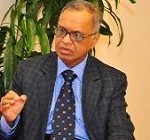In his return to the chief’s chair to revive the premier Indian information technology giant Infosys Technologies which he co-founded, N. Narayanamurthy is following a well-worked tradition in the corporate world. This return, however, has a new twist: Murthy will be accompanied into the executive suite by his 30-year old computer scientist son, Rohan, who will serve as his executive assistant at an annual salary of Re.1.
A son working in his father’s office – business or political – is the norm in India. Except that Infosys is a globally-recognized, publicly-listed company. The similarity to Sonia Gandhi coming in to ‘save’ and lead the Congress party and later inducting her son Rahul Gandhi as party vice-president, has not been lost on the public. And so a fury of indignation has swept across the country from those who saw Murthy as the icon of good governance and professionalism, a bulwark against the nepotism and crony capitalism that has seized Indian politics and even cricket, today. It’s India’s most perverse moment yet: instead of politics taking its cue from professional business, business is taking its cue from politics and reinforcing family ties.
The importance of Infosys is manifold: technically, it is a bellweather on the Bombay Stock Exchange Index and is a prominent weight in most large cap benchmark indices including the Morgan Stanley Capital International (MSCI) Index, which is tracked by major global investors. Philosophically, for ordinary Indians, Infosys showed that a professional entrepreneur could virtuously climb up and share the exalted space traditionally occupied by the Tata and Birla families, without having to ‘change the system’ as the entrepreneurs of petrochemicals maker Reliance and real estate developer DLF have done. Murthy himself rode the high ground on corporate governance, stating often that nepotism was unacceptable.
It inspired a blossoming of entrepreneurship in India; Bangalore is India’s most fertile start-up ground, creating a start-up a day. Good, but not enough. Few of those entrepreneurs are Infosys employees. Despite its grand campuses, Singapore-style functioning and rise to international stature, Infosys is simply a company with coding talent.
Nothing wrong with that, except that a city full of coders is unlikely to create new products and services in the image of its guru, Silicon Valley. There, despite the severe recession, the last five years have seen the creation and growth of valuable companies like Apple, Facebook, Google, Tumblr and Netflix. Instead, Bangalore – and Infosys – sat on the export laurels earned since 2000, making many billionaires but not the necessary investment into the future. The industry has now lost steam and is as lacklusture as the Indian economy. Infosys’ own coding skills have been gnawed away at the bottom by rival TCS, and grabbed at the top by Cognizant, a virtual upstart. Its stock has been the most volatile on the Indian market for the last ten quarters, losing 8% in the past three years while Cognizant is up 40%. Till last year India’s premier IT player, Infosys now stands in third position, behind TCS and Cognizant.
Murthy’s return to Infosys has pushed its stock up 4% since June 1. His job is to fix the company – in which he has a 5% stake valued at $1.5 billion – groom the next generation of professional leaders and make a graceful exit, ensuring that his son stays out of the company. In any case, family businesses across India are professionalising, says a 2011 Credit Suisse report, and are all the better for it. Such moves from Murthy will send the right signal to shareholders, other entrepreneurs, politicians – and even the match-fixers on India’s cricket board.
If he doesn’t – well, the politicians in Delhi will have the last laugh.
Manjeet Kripalani is the Co-founder and Executive Director of Gateway House: Indian Council on Global Relations.
This article was exclusively written for Gateway House: Indian Council on Global Relations. You can read more exclusive content here.
For interview requests with the author, or for permission to republish, please contact outreach@gatewayhouse.in.
© Copyright 2013 Gateway House: Indian Council on Global Relations. All rights reserved. Any unauthorized copying or reproduction is strictly prohibited.


